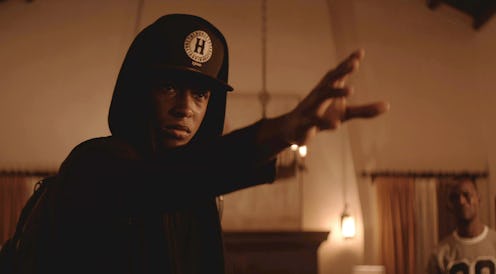Entertainment
'Sleight' Could Lead Black Millennials Into Tech
JD Dillard’s science fiction film Sleight is entertaining and inventive, but it's also incredibly important; the movie's focus on a young Black man delving into the tech world could inspire more Black millennials to become techies and create transformative devices in the industry. Set in Los Angeles, the film, which opens April 28, follows Bo (Jacob Latimore), a 20-something street magician who is struggling to raise his younger sister Tina (Storm Reid) after the death of their mother. To make ends meet, he relies on his daily magic shows and nightly drug dealing for the community dealer Angelo (Dule Hill), but although his life is double-sided and daunting, the most compelling thing about Bo is his ability to incorporate tech engineering into his magic.
At first, Sleight is full of mystery as to how Bo received his magical powers, which allow him to levitate small metallic objects in order to ramp up his street magic show crowds. But later, we come to find out that (spoiler alert) his powers stem from an unusual electromagnetic device he invented— it's like Iron Man meets a young Dwayne Wayne from A Different World. It's a cool device, but more than that, it's meaningful; Black people are rarely represented in the tech world, both on-screen and in reality, and it's so important that viewers see an example of a young Black man exploring STEM and becoming a creator.
Sleight's depiction of a young Black techie who wants to bend the normalcy of the modern world through off the wall inventions is inspiring and necessary. All too often, sci-fi and tech movies leave Black people out of the equation; Divergent, Prometheus, The Terminator, 2001, War of the Worlds, Tron, Stargate, Total Recall Demolition Man, and Avatar are just a few of the many movies in which almost none of the main or supporting cast members are Black.
And the rare times when Black actors are added to popular sci-fi/fantasy films, backlash to their casting frequently arrives. In 2015, for instance, when Michael B. Jordan played Johnny Storm/The Human Torch in Fantastic Four, his casting in the traditionally white role caused a huge uproar — and let's not forget the critical comments about Idris Elba playing Heimdall in Thor, when some people insisted it was wrong for a Black man to play a Nordic god in the movie.
Sleight's portrayal of a Black man in tech matters, and its filmmakers are completely aware of this. "It's very important for people to see movies like this, especially for this genre it really means a lot for people to come see it. People [need] to see this representation," said Dilliard at a recent screening of Sleight that I attended. "So much of Bo is pulled from my childhood because I was the Black nerd that was building computers and tearing apart televisions to create things. "
There needs to be more Black tech representation in film, just as there needs to be in the real world. According to Nielsen, Black people are some of the largest tech consumers, but there is a huge disparity in seeing that same representation on the side of creating tech platforms. According to Business Insider, there's a major lack of Black techies in Silicon Valley, with Black people comprising less than five percent of the total number of tech company employees.
That's why movies like Sleight are so important. If viewers don’t have people who look like them or relate to the same things as they do onscreen, they might not be convinced to pursue certain dreams or careers. Sleight could encourage more young Black people to get involved in tech, and turn those disappointing statistics around. Representation means everything, and this movie will hopefully influence many young, curious minds, helping to create a much-needed dialogue and inspire its viewers.
